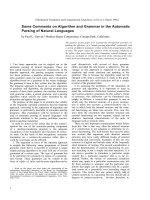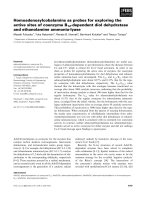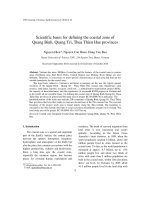Why some things should not be for sale the moral limits of markets book by debra satz
Bạn đang xem bản rút gọn của tài liệu. Xem và tải ngay bản đầy đủ của tài liệu tại đây (1.78 MB, 265 trang )
WHY SOME THINGS SHOULD
NOT BE FOR SALE
OXFORD POLITICAL PHILOSOPHY
General Editor: Samuel Freeman
University of Pennsylvania
Oxford Political Philosophy publishes books on theoretical and applied
political philosophy within the Anglo-American tradition. The series
welcomes submissions on social, political, and global justice, individual
rights, democracy, liberalism, socialism, and constitutionalism.
Imposing Values: An Essay on Liberalism and Regulation
N. Scott Arnold
Liberalism and Prostitution
Peter de Marneffe
Why Some Things Should Not Be for Sale: The Moral Limits of Markets
Debra Satz
WHY SOME THINGS SHOULD
NOT BE FOR SALE
The Moral Limits of Markets
DEBRA SATZ
2010
Oxford University Press, Inc., publishes works that further
Oxford University’s objective of excellence
in research, scholarship, and education.
Oxford New York
Auckland Cape Town Dar es Salaam Hong Kong Karachi
Kuala Lumpur Madrid Melbourne Mexico City Nairobi
New Delhi Shanghai Taipei Toronto
With offices in
Argentina Austria Brazil Chile Czech Republic France Greece
Guatemala Hungary Italy Japan Poland Portugal Singapore
South Korea Switzerland Thailand Turkey Ukraine Vietnam
Copyright © 2010 by Oxford University Press, Inc.
Published by Oxford University Press, Inc.
198 Madison Avenue, New York, NY 10016
www.oup.com
Oxford is a registered trademark of Oxford University Press
All rights reserved. No part of this publication may be reproduced,
stored in a retrieval system, or transmitted, in any form or by any means,
electronic, mechanical, photocopying, recording, or otherwise,
without the prior permission of Oxford University Press.
Library of Congress Cataloging-in-Publication Data
Satz, Debra.
Why some things should not be for sale : the moral limits of markets / Debra Satz.
p. cm. — (Oxford political philosophy)
ISBN 978-0-19-531159-4
1. Free enterprise—Moral and ethical aspects.
2. Capitalism—Moral and ethical aspects. I. Title.
HB95.S33 2010
174′.4—dc22
2009035769
1 3 5 7 9 8 6 4 2
Printed in the United States of America
on acid-free paper
To Richard C. Friedman
This page intentionally left blank
Contents
Acknowledgments
Introduction
ix
3
PART I
1.
What Do Markets Do? 15
PART II
3.
2. The Changing Visions of Economics 39
The Market’s Place and Scope in Contemporary Egalitarian
Political Theory 63
4. Noxious Markets 91
PART III
5.
9.
Markets in Women’s Reproductive Labor 115
6. Markets in Women’s Sexual Labor 135
7. Child Labor: A Normative Perspective 155
8. Voluntary Slavery and the Limits of the Market 171
Ethical Issues in the Supply and Demand of Human Kidneys 189
10. Conclusion 207
Notes 211
Bibliography 237
Index 249
This page intentionally left blank
Acknowledgments
I have been thinking and writing about this topic for a long time and
along the way I have accumulated a lot of debts. If anyone ever demanded
that those debts be cashed out in monetary terms, I would be broke.
Luckily I have benefited from our social norms of reciprocity and kindness, and I hope to repay these debts in that currency.
Some people helped by leading me to have a sense of possibility, a
reason to hope that the world was not a fixed place to be merely accepted or tolerated. These people led me out of not only the external
poverty in which I grew up, but also the poverty of having leveled aspirations. Here I must thank my father, who filled our house with books,
and Richard Friedman, who set me on the road I have taken and kept a
strong wind at my back.
Many people generously helped with advice and information, reading
parts of the book and in some cases the entire manuscript. I would like to
thank the following people and to ask forgiveness of anyone else whose name
I unintentionally omit. Rob Reich, Josh Cohen, John Ferejohn, Elizabeth
Hansot, Andrew Levine, Elizabeth Anderson, Susan Okin, Barbara Fried,
Zosia Stemploskawa, Adam Rosenblatt, Allen Wood, Tom Nagel, Lewis
Kornhauser, Seana Shiffrin, Jonathan Wolf, Yossi Dahan, Ben Hippen, Anabelle Lever, Liam Murphy, and Paul Gowder each provided me with helpful
comments. Everything here is better as a result of their efforts.
I have presented parts of this work on various occasions and received
excellent suggestions. I thank the following organizations and the audiences: the Philosophy Department at the University of Michigan
and Marshall Weinberg for endowing the chair that enabled me to
spend three months in Ann Arbor; the Colloquium in Legal, Political,
and Social Philosophy at New York University Law School; the Law,
Economics, and Politics Colloquium at New York University Law
School; the Aristotelian Society; the University of Manchester; the
ix
x
Acknowledgments
MIT Philosophy Department; the Ramat Gan Law School; the University of Victoria; the Princeton Center for Human Values; the University of Toronto Law School; the University of Texas at Austin Law
School; the Stanford University Workshop on Global Justice, and the
University of Melbourne.
I have also benefited from the work of a number of gifted Stanford
undergraduate research assistants, including Eric Pai, Joseph Shapiro,
Jose Campos, Caleb Perl, and Alexander Berger. One of the great pleasures of teaching at Stanford is the chance to interact with so many talented and passionate students. I have also relied on the amazing staff
support in the Philosophy Department and at the Bowen H. McCoy
Family Center for Ethics in Society. I could not have finished this without unloading some of my administrative work on Joan Berry in particular. Thanks to all of you.
I have had financial support during the time of the writing of this
book, including fellowships from the Stanford Humanities Center and
the Princeton Center on Human Values, a research grant from the vice
provost for undergraduate education at Stanford, and funding as a Marta
Sutton Weeks Faculty Scholar, also at Stanford. I am grateful for all of
this support, which provided me invaluable time to work. I must also
mention the Neon Rose Guest Cabin in Point Reyes Station that allowed
me a room of my own (with a view of the bay!) to finish this book.
Some of these chapters appeared in earlier incarnations, and I am
grateful to the editors of the following journals for permission to reprint
updated versions of these early arguments: Philosophy and Public Affairs
(chapter 5), Ethics (chapter 6), The World Bank Economic Review (chapter
7), Social Philosophy and Policy (chapter 8), and the Aristotelian Society
(chapter 9). A very distant relative of chapter 4 appeared in Globalization,
Culture and the Limits of the Market, edited by Stephen Cullenberg and
Prasanta Pattanaik (New Delhi: Oxford University Press, 2004). A closer
cousin of chapter 2 will be appearing in Nineteenth Century Philosophy,
edited by Allen Wood (Cambridge: Cambridge University Press, 2010).
My friends have undoubtedly heard a lot more about this book and
the trials of writing it than they would have liked. I have been very fortunate to have a wonderful community of friends ranging from Palo
Alto to the Bronx. Their friendship and companionship sustained me
through the ups and downs. I am especially grateful to Kathryn Pryor
for helping me to maintain my focus.
Acknowledgments
Thanks are also due to my editor at Oxford University Press, Peter
Ohlin, and the generous comments of the editor of the series in which
this book is appearing, Samuel Freeman. Judith Hoover’s copyediting
helped get the manuscript into final shape.
I have been blessed with a good that no amount of money could ever
buy: a happy family. I am grateful for the love and support of my husband, Don Barr, and our son, Isaac Barr Satz. Don read much of the
book, talked with me about it, offered editorial suggestions, and supported me in all of my efforts. Isaac has brought his knowledge of the
rival theories of distributive justice to bear on his Little League games,
bringing great joy to his mother.
xi
This page intentionally left blank
WHY SOME THINGS SHOULD
NOT BE FOR SALE
This page intentionally left blank
Introduction
Markets are important forms of social and economic organization. They
allow vast numbers of people who are otherwise completely unknown
to one another to cooperate together in a system of voluntary exchange.
Through markets, people are able to signal to one another what they
want, disseminate information, and reward innovation. Markets enable
people to mutually adjust their activities without the need for a central
planning authority. Furthermore markets are widely recognized as the
most efficient way we have to organize production and distribution in a
complex economy.
It is not surprising, therefore, that with the collapse of communism,
markets and the political theories that advocate expanding the market
have been enjoying a considerable resurgence. Markets are not only
spreading across the globe, but they are also extending to new domains,
such as environmental pollution.1 For many people market institutions
are assuming the role of an all-purpose remedy for the defects of
the cumbersome government bureaucracies of the Western world, the
poverty of the Southern world, and the coercive state control of the
planned economies. This remains true despite the recent economic
downturn.
At the same time as markets have expanded their reach, new controversies have arisen concerning the morality of markets in human organs,
reproductive services, diamonds that fuel bloody civil wars, sex,
weapons, life-saving medicines, addictive drugs—and now credit derivatives. Markets in these goods are seen as fundamentally different from,
and elicit very different reactions than, markets in automobiles or soybeans. Such markets, we might say, strike many people as noxious, toxic
to important human values. These markets evoke widespread discomfort and, in the extreme, revulsion.
3
4
Why Some Things Should Not Be for Sale
Consider child labor, a case I take up in chapter 7. Child labor is
common in many developing societies and indeed was once prevalent
in what is now the developed world. Some economists and policy advisors have argued that banning child labor is a mistake because some
families rely for their survival on the labor of their children. At the same
time many believe that protecting young children from working is a
moral requirement for any decent society.
Consider a second example: human kidneys. Selling a kidney is currently illegal in every developed society, even though in such societies
there is a chronic shortage of donor organs. From an economist’s perspective, the ban on selling is inefficient because it is likely that monetary incentives would increase supply and thereby save lives. But some
people would not accept the sale of organs under any circumstances. I
discuss this case in chapter 9.
What considerations ought to guide the debates about such markets?
Are there some things that should not be bought and sold? More generally, what is it about the nature of particular exchanges that strike us as
noxious? How should our social policies respond to these noxious markets? I have been thinking and writing about these questions for more
than a decade, and this book presents and defends my answers.
My answers have been shaped, to a significant degree, in response
to the dominant perspectives on markets and their limits found in
contemporary economics and political philosophy. Although these perspectives contain important insights, I have found the theoretical categories they employ of only limited use in answering these questions.
This is because both groups of scholars generally assume that markets
are a homogeneous institution, raising similar issues across distinct
domains. But this assumption is mistaken. Markets not only allocate
resources among different uses and distribute income among different
people, but particular markets also shape our politics and culture, even
our identities. Some markets thwart desirable human capacities; some
shape our preferences in problematic ways; and some support objectionably hierarchical relationships between people. Efficiency is clearly
not the only value relevant to assessing markets: we have to think about
the effects of markets on social justice, and on who we are, how we relate
to each other, and what kind of society we can have. For example, even
if markets in goods such as child labor were efficient, we would still have
reasons to object to such markets if they had harmful consequences for
Introduction
children or threatened democratic governance.2 In this book I challenge
the one-dimensional view of markets found in many economics textbooks and seek to address markets as institutions that raise political and
moral questions as much as economic ones.
I also reject the flattened-out view of markets still found in much
contemporary liberal philosophy. Most liberal egalitarian theorists analyze problematic markets through the lens of distribution and not (or
not only) the economist’s lens of efficiency. From the egalitarian’s angle
of vision, what underlies noxious markets—markets in sex, organs,
child labor, kidneys, or bondage—is a prior and unjust distribution of
resources, particularly of income and wealth. The problem with child
labor, on this view, is the whip of poverty and hunger that compels parents to put their children to work, not the market in child labor itself.
This is a powerful view. Like these egalitarians, I also think that the
fairness of the underlying distribution of wealth and income is extremely
relevant to our assessment of markets, including those involving child
labor. Certainly some of the markets that strike us as noxious do so
because of their origins in destitution and desperation. But in this book
I argue that we have reasons to block certain markets, to limit the
domain of things that money can buy, even when such limits cannot be
justified by considerations of economic desperation or by a prior unjust
distribution of income and wealth. The kind of equality I advocate has
noneconomic dimensions and depends on access to specific goods, such
as education, health care, and employment.
In addition to criticizing the dominant contemporary approaches to
the limits of the market, I also seek to revive earlier traditions of political
economy and egalitarian political philosophy. These earlier traditions
recognized the distinct nature of different kinds of markets. Early theorists of the market such as Adam Smith and David Ricardo were especially attuned to the ways that particular markets could promote, but
also could undermine, relations of freedom and equality between members of a society. The classical political economists noted, for example,
that labor markets could function in ways that shaped their participants
as submissive inferiors and dominating superiors bent on exercising
their arbitrary power. These thinkers also noted the ways certain markets were inherently characterized by asymmetric information and
enforcement problems that allowed some market exchangers to exploit
others. At the same time they believed that when properly structured
5
6
Why Some Things Should Not Be for Sale
and limited, markets had a very significant role to play in undermining
the hierarchical organization of feudal society and advancing egalitarian
social relationships.
Nineteenth-century social liberals such as T. H. Marshall argued that
some specific goods, such as education, access to employment, health
care, and votes, are necessary if citizens are to be equals and so should
be guaranteed as a right. Rights are things that lie outside the domain of
the market, at least to a certain extent. For example, to view health care
as a right is to argue that there is some entitlement to health care that is
independent of the cash nexus. The same holds true for the right to
freedom of speech: even though access to very large audiences can be
expensive, to view speech as a right entails that no one has to give a
monetary payment to purchase the freedom to speak itself. As Marshall
wrote, “Social rights in their modern form imply an invasion of contract by status, the subordination of market price to social justice, the
replacement of the free bargain by the declaration of rights.”3
Although I disagree in many details with thinkers like Smith and
Marshall, my book revives in broad strokes these earlier arguments—
that some markets shape individuals and society in problematic ways
and that some specific goods need to be shielded from the operation of
the market. The animating vision of this book, and of its central argument, is that of a society of equals: a society where there is “no more
bowing and scraping, fawning and toadying; no more fearful trembling;
no more high and mightiness; no more masters, no more slaves.”4 As we
shall see, markets make an important contribution to the possibility of
such a society, but to do so they need limits, and some goods need to be
guaranteed to all.
THE PLAN OF THE BOOK
This book proceeds from and builds on some of my earlier essays, integrating them into a more general theory for assessing markets. The
development of that theory proceeds in three parts. The first part of the
book introduces the idea of the market as an economic and social mechanism for setting prices, coordinating behavior, and promoting choices.
The approaches of welfare economics and neoclassical economics offer
Introduction
powerful arguments in favor of the market mechanism. In particular
the market is often (but not always) better in a technical sense than
alternatives: it is more efficient as an outcome for everyone involved.
I explain and defend (in part) the insights from these two economic
approaches to the market. Nevertheless a few examples can serve to
highlight the limitations of these modes of economic reasoning. I argue
that neither of these approaches can adequately explain our negative
responses to certain kinds of markets (sex, weapons, pollution), nor can
they explain why bans on particular markets (for votes, mercenaries, or
salvation) might nevertheless be justified, even in cases where those
bans generate inefficiencies.
The second part of the book builds the case for my own theory. I
begin, in chapter 2, by setting out the view of markets found in classical
political economy. For the classical economists the term market actually
referred to a heterogeneous collection of economic relations. Adam
Smith and his followers offered distinct theories of the functioning not
only of consumer goods markets, but also of markets in land, labor, and
credit. Their theories took account of the particular objects that different markets exchange: Smith pointed out the risky motivations of the
borrowers of money; Ricardo and Malthus focused on the natural limits
to the supply of land; and Marx singled out the distinctive nature of
human labor power as a commodity whose purchase gives some people
power and authority over others.5
Two features of the classical treatment of markets are important for
the view that I develop. First, the classical political economists focused
on the ways that certain exchanges can influence the people we become.
In particular they saw that the labor market could shape the parties to
the exchange in a way that a typical commodity market—a market in
cars, for example—does not. These theorists noted that what a person
can do and be, what he wants and what he can hope for, are importantly
influenced by the structure and character of the labor market.
Second, these theorists noted that the structure of certain markets, the
differing ability of the parties to exit the market and find alternatives, gives
rise to relations of dominance and subordination between the parties. For
example, they recognized that there are contexts in which some people
have an urgent need for goods that other people control. In such circumstances the position of the weaker party is not only vulnerable to abuse
and exploitation, but is utterly dependent on the will of another.6
7
8
Why Some Things Should Not Be for Sale
In chapter 3 I explore the place of the market in contemporary egalitarian political philosophy. This is the most intramural of the chapters,
providing details of recent philosophical arguments that have been
made about the role of the market in a just society. Historically markets
have provoked clashing opinions among egalitarians, but today most
egalitarians acknowledge a substantial role for the market. At the same
time some contemporary egalitarians have gone further; for example,
the philosopher and legal theorist Ronald Dworkin has argued that the
market is essential to our very understanding of what equality is. He
concludes this because he thinks that equality requires that people have
equal resources and that markets allow people with different preferences to acquire the goods that matter to them without violating the
resource equality requirement. We need the market to show that the
bundles of different goods that egalitarian theory says each of us has an
initial claim on are in fact of equal value. One goal of this chapter is to
argue that it is a mistake to think that markets can play this a priori role
with respect to determining the shape of distributional equality. Markets are important institutions with a role to play in advancing social
equality, but egalitarians have good reasons to reject some of the results
that even perfect markets would throw our way.
Even egalitarians who treat markets as a merely instrumental mechanism for producing wealth tend to think that a focus on specific markets, markets in particular goods such as labor or kidneys, is a mistake.
Most contemporary egalitarians are what the economist James Tobin
once referred to as “general egalitarians.”7 General egalitarians recognize that targeted interventions in specific markets—rationing the sale
of gasoline, for example—tend to be more inefficient than the generic
redistribution of income. Some political philosophers also embrace
general egalitarianism because they reject blocks on specific markets as
paternalistic intrusions on personal liberty. They think that, unless
others are harmed, restricting what people can do with their own income
fails to treat them with respect. On the general egalitarian view, rather
than looking at the workings of any particular market we should focus
on the underlying distribution of resources. Once the underlying
distribution of resources is fair, we should let markets do their work. If
there are market imperfections, or if we think the market simply generates too much inequality, then we can correct these problems by a taxand-transfer system.
Introduction
I argue that tax-and-transfer egalitarianism has been too inattentive
to the political and relational consequences of certain markets, the ways
that certain markets shape us, our relationships with others, and our
society. A just society requires restrictions on some of the market choices
its citizens might make; an obvious example is a market in votes, but I
hope to show that there are other, less obvious, cases as well.
The fourth chapter is the heart of the book, elaborating my theory of
what makes particular markets noxious. The theory is complex. I identify four parameters that are relevant to the assessment of individual
markets. These parameters are vulnerability, weak agency, extremely
harmful outcomes for individuals, and extremely harmful outcomes for
society.8
The first two parameters, vulnerability and weak agency, are characteristics of the sources of a market: they characterize what people bring
to a market transaction.9 Markets can arise in circumstances in which
some people are so poor or so desperate that they accept any terms of
exchange that are offered. Let us say that people in such markets suffer
from vulnerability. Other markets arise in circumstances in which some
parties have poor information about the goods they are exchanging, or
in which some parties are not direct participants in the exchange but
depend on others’ decisions. Let us say that that people in such markets
have weak agency.10
The second two parameters are characteristics of the outcomes of a
market. Some markets may operate in ways that leave some of the participants in extremely bad circumstances, for example, circumstances in
which they become destitute or in which their most basic interests are
undermined. Let us say that such markets produce extremely harmful
outcomes for individuals. Some markets produce extremely harmful outcomes not only for individuals but also for society: they undermine the
framework needed for a society of equals, supporting relations of
humiliating subordination or unaccountable power.
In chapter 4 I explain in detail the meaning of these four parameters
and argue that scoring high along even one parameter (e.g., extremely
harmful outcomes for children in child labor markets) can push a market into the “noxious” category. Yet although in principle any market
can become noxious, I also argue that particular markets are much more
likely to produce extremely harmful outcomes, manifest weak agency,
exploit underlying vulnerabilities, or support extremely harmful and
9
10
Why Some Things Should Not Be for Sale
inegalitarian social relationships than other markets. For example,
markets in health care, education, labor, and political influence all
have, unlike apple markets, significant consequences for the structure
of relationships between people in contemporary American society.
These markets also have important effects on who we are, what we care
about, what we can do and the kind of society that we can achieve. In
the end, I try to show how many—if not all—noxious markets threaten
democracy.
The argument of this chapter provides a framework for thinking
about markets as well as criteria against which potential interventions in
a market will need to be checked. It is not obvious that the best response
to the existence of a noxious market is to ban it. In some cases banning
a particular market may in fact intensify the problems that led us to
condemn that market in the first place.11 Legal or tolerated child labor,
for example, is likely to be preferable to child prostitution in a black
market. Where there are good reasons to refrain from blocking a particular market we may want to adopt measures that directly target the specific problems with that market, perhaps by changing background
property rights or by income redistribution. Still, I intend to show that
some particular markets need to be blocked altogether; there is sufficient reason to draw some bottom lines.
The third part of the book uses the theory I have developed to analyze
current controversies about the scope of the market. Chapters 5 through
9 discuss markets in women’s reproduction, prostitution, child labor,
bonded labor, and human organs. In each case I call attention to dimensions of moral concern raised by such markets that are difficult to fully
capture from the perspectives of economics and tax-and-transfer egalitarianism. In each case I look beyond considerations of efficiency and
distributive equality to the broad cultural and political effects of these
markets.
I should emphasize that this book is a work of political philosophy,
not economics. It challenges normative aspects of the neoclassical and
welfare economist’s approaches to markets, not their explanatory power.
The main categories of those approaches do not allow us to ask the full
range of questions that I believe are relevant to the assessment of markets. Indeed these approaches were not designed to ask such questions.
This book is also critical of the role that contemporary egalitarian theory
has given to the market. When we think of markets only in terms of the
Introduction
distribution of goods and not in terms of the relationships of the people
who produce and exchange those goods, crucial evaluative questions
are also excluded from our decision frame. To evaluate markets we need
to consider not only the production and distribution of goods, but also
the social and political relationships that various markets sustain and
support, including their effects on rich and poor, women and men, and
the more or less powerful. We need to examine the effects of various
markets on the social norms that underwrite our relationships with one
another.
I have two aims in this book. The first is theoretical and is primarily
addressed to contemporary political philosophers and philosophically
minded economists; the second is practical and addresses current policy
controversies. First, I hope to contribute to current discussions of
equality. Among the questions that I consider are the following: In what
ways do markets advance social equality? Are restrictions on the market
transactions of consenting adults necessarily paternalist? What is the
relationship between markets and equal citizenship in a democracy? My
second more practical aim is to sketch an approach to markets that can
be of use in guiding debates not only about the cases specifically discussed in this book but also in other cases, including controversies over
the appropriate role of markets in the production and distribution of
life-saving drugs, private prisons, education, the buying and selling of
subprime mortgages, the regulation of carbon, and political influence.
Of course each of these cases raises complex empirical matters that bear
directly on what we should do in each case. The perspective I develop
here is not intended as a blueprint.
Indeed, as will be apparent, my approach is importantly open-ended:
I do not rank the various parameters for assessing markets against one
another, nor do I offer mathematically precise definitions; there is no
formula ascertaining how high a score along one of the parameters has
to be before a market should be seen as noxious. Instead my argument
will have been successful insofar as I have convinced my readers of the
need for a fine-grained view of markets and their complex relationship
to social equality.
11
This page intentionally left blank









